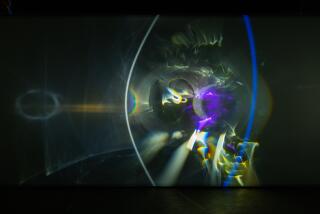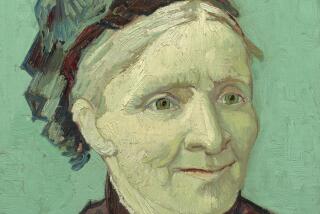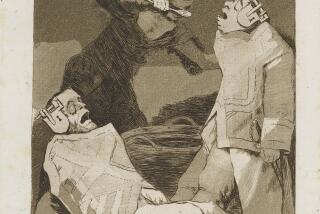Illusions of Water and Power
Warnings, perhaps. Images gleaned from collective memory. Seductive fictions.
James Casebere’s extraordinary new photographs at Grant Selwyn Fine Arts ride their multiplicity with grace. They are gorgeous, but at the same time, disquieting. They reference history, but with tremendous sensual immediacy.
“From the beginning,” Casebere has said, “I had a tendency to conflate personal and social history--or psychological and political content.”
The beginning, in terms of Casebere’s career, was more than 20 years ago, and the tendency he describes has coursed through work that’s grown increasingly complex and refined. The 10 new pictures here are big (displayed at 4 feet by 5 feet) digital chromogenic prints mounted on Plexiglas. Each depicts an interior of convincing texture and human scale that is actually a small cardboard and plaster model built by Casebere in his New York studio and exquisitely lighted for each photograph. The illusionistic quality alone is stunning (though intentionally not seamless). The body reads these spaces as accessible, functional, congruent with its own scale.
Several images position us at the end of a vaulted passageway, monastic in its austerity. Windows and arched doorways set deep within thick gray walls send raking light onto the dusty floor. The emptiness of the space is profound, as if not just vacant but abandoned.
Most of the other photographs show rooms whose colored walls (yellow, green) and crisp architectural trim relate to settings in the Palace of Versailles and Jefferson’s home, Monticello. They are elegant spaces, spaces of authority and wealth. But Casebere has flooded them, and the layer of water--which burns white or sends spidery yellow veins flickering on the walls--pushes splendor into the past tense. Power has passed from these places, their authority rinsed by the primordial flood.
Casebere twists together allegory and document into something smooth, sophisticated, engrossing and tantalizingly elusive. The narrative possibilities suggested by these sets are myriad, and the power they command as images has to do with their very ambiguity.
Casebere’s own editorial restraint is, in part, what allows us to venture in, to occupy the scenes, to intuit their power, and to waver between feelings of solitude and isolation, in spaces that evoke both sanctuary and cell.
*
“James Casebere: New Photographs,” Grant Selwyn Fine Art, 341 N. Canon Drive, Beverly Hills, (310) 777-2400, through Sept. 7. Closed Sunday and Monday.
More to Read
The biggest entertainment stories
Get our big stories about Hollywood, film, television, music, arts, culture and more right in your inbox as soon as they publish.
You may occasionally receive promotional content from the Los Angeles Times.










